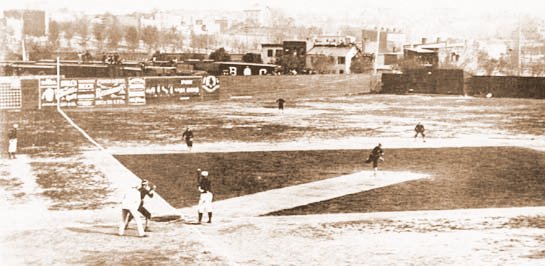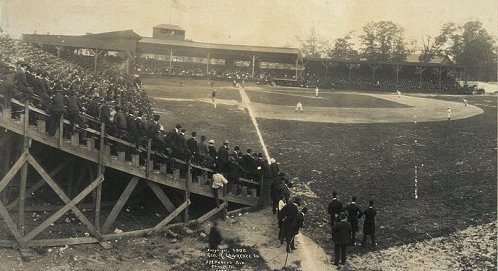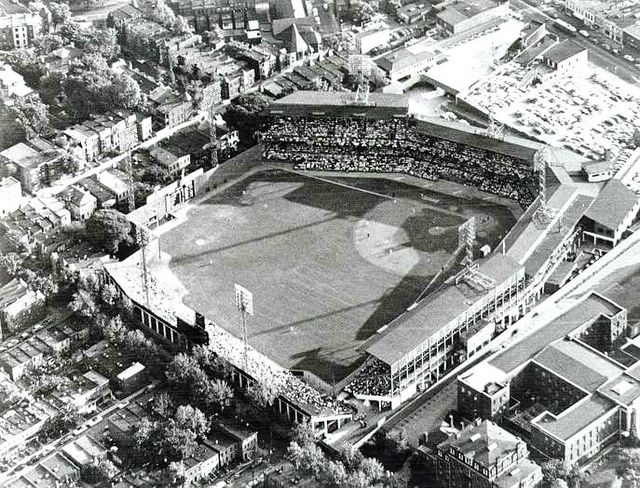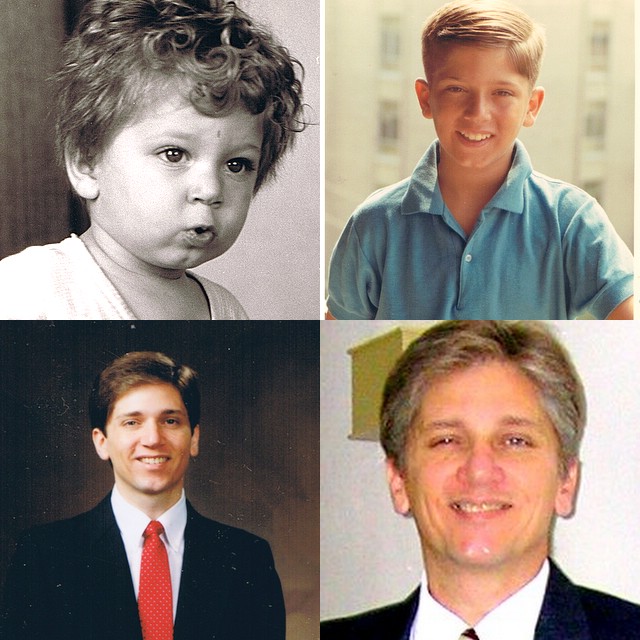Selig Is The Best At Something, Anyway
 [December 13th] -- Charley Bell, CEO of McDonalds, was dealing with the problem first hand. The owner of the McDonalds in St. Charles, Missouri had died suddenly, and his wife didn't want to retain her interest in the business. As was the practice of the time, the corporation purchased the unit from her and put it on the market. As the process of selling the location was in full swing, St. Charles city officials informed the corporation that the property had been condemned years ago, but the previous owner was "grandfathered," meaning that the city wouldn't take over the property until after he was no longer the owner.
[December 13th] -- Charley Bell, CEO of McDonalds, was dealing with the problem first hand. The owner of the McDonalds in St. Charles, Missouri had died suddenly, and his wife didn't want to retain her interest in the business. As was the practice of the time, the corporation purchased the unit from her and put it on the market. As the process of selling the location was in full swing, St. Charles city officials informed the corporation that the property had been condemned years ago, but the previous owner was "grandfathered," meaning that the city wouldn't take over the property until after he was no longer the owner.
The city paid the company "fair market value" and gave McDonalds 30 days to vacate the property. It was all very legal and very surprising. Working quickly, they found a piece of property in nearby Wentzville, and met with the mayor and city council to offer a proposal. McDonalds would open in their community a "next-generation" facility if the city would agree to a "few" requests. Reduced taxes. No cost improvements to the surrounding infrastructure. Relaxed building codes and an interest free loan to aid in construction of the building. The mayor and council ultimately gave in because the community was suffering severely in the economic downturn, and the 30+ new jobs would greatly help its citizens.
An agreement was reached and the deal finalized.
In the meantime, it was decided that the restaurant would open temporarily in an old building across the street that used to house the town's "Red Barn" eatery until it went out of business two decades earlier. It was built during a time when fast food restaurants were designed without regard to amenities. The lobby was too big, and the cooking area too small. The parking lot wasn't even large enough to house the employees' cars. The one toiled worked. Sometimes. McDonalds Corporate demanded that the city provide the building and utilities free of charge while the new restaurant was under construction. Wentzville officals reluctantly agreed.
The people of Wentzville embraced the new McDonalds, even in its archaic environment. Because of the reduced cost of doing business, and the long lines of eager customers, McDonalds' corporate coffers began to bulge with the profits coming in from the Wentzville location. The manager of the store asked for permission to fix the toilet that didn't always flush, but the corporation refused. It wasn't their building, they said. Go ask the city. During the winter, the icy parking lot [too expensive to plow, go ask the city] became a hazard as several accidents occurred. Four people were injured.
The people of Wentzville became angry and city officials began to have second thoughts regarding their "deal" with McDonalds. They now distrusted the corporate leaders and wanted an owner to be named before they approved the loans and various freebies already agreed to. The city wanted to make sure that the owner wasn't going to be someone like Charley Bell and the other McDonalds administrators. No lackies, they demanded. McDonalds refused. They wanted their new building finished and in their possession before naming an owner. The city wanted someone from their town as the owner, and they feared McDonalds would bring in some "outsider" that they couldn't trust.
The impasse continued for months. Slowly, the old building became so run down that fewer and fewer people stopped by the old red barn for lunch and dinner. The manager left for a better job with Burger King. Three of the top four assistants moved on as well. McDonalds was forced to hire substandard help to replace the lost employees. Some stole money and food. Others didn't care about their work. Things turned sour very quickly. It wasn't very long before the Wentzville McDonalds began to lose money. Big time. The customers didn't like the building or the employees or the situation in general.
The city council threat ened to withdraw the incentives if McDonalds Corporate didn't immediately name an owner and make improvements to the temporary facility. Bell refused. Soon, the unit was losing more money than any other U.S. McDonalds franchise. Still, Bell wouldn't name an owner.
ened to withdraw the incentives if McDonalds Corporate didn't immediately name an owner and make improvements to the temporary facility. Bell refused. Soon, the unit was losing more money than any other U.S. McDonalds franchise. Still, Bell wouldn't name an owner.
Several months later, the council gave up and closed the old Red Barn building. McDonalds, having lost hundreds of thousands of dollars, moved the unit to another city that was willing to "pony up." Wentzville, so willing and so anxious to support their McDonalds, was left with a hunger in their stomachs and no way to fill it. McDonalds stock took a hit for a year because of the severe losses incurred during the fight with the city.
But they sure showed those city officials, didn't they? Bell and the board of directors "won," but they corporation lost.
Of course, all of this would never happen. There is no possible scenario that would allow a CEO of a large corporation to devalue its product just "because." Expensive lessons simply aren't taught in the business world. By manipulating one McDonalds unit, the value of the surrounding locations would certainly have suffered. Any CEO, any president or board of directors would have been fired long before any real damage like this could have been done.
In a world where Jerry Bell gets fired, baseball CEO Bud Selig gets lionized for doing the same thing. Bud moves the club. Bud demands concessions. Bud holds the city of Washington ransom. Bud refuses to name the new owner of the team until after every 'i' is dotted and every 't' is crossed in the deal. The Nationals have lost several of their players, and may still lose their entire management team. The city council won't know if Selig chooses a real owner or a "ringer" until after they have committed half a billion dollars for the team and for the benefit of Major League Baseball.
"Google-search" Bud Selig and you'll find countless stories and articles written about his lack of honesty and poor business acumen. Story after story is written by the national press about Selig and Major League Baseball "screwing" or "hurting" or "stealing from" the city of Washington and its fans. Selig doesn't care. He pretends the past year has been little more than a minor procedural boo-boo, and that the sale will be finalized "soon." Selig is a fraud, everyone knows it, and he doesn't care.
CEO's in the real world answer to their board of directors. Screw up they screw you. It's a good system. It's worked well for a few hundred years or so. Baseball, however, uses a system founded not on America's free-enterprise system but rather communism's monolithic, top-heavy central authority. And trying to ovethrow Selig is as impossible as trying to overthrow Lenin or Stalin. Look up the word "entrenched" in the dictionary and you'll find a picture of the de facto dictator himself.
There's not much we can do about all this, and that stinks. I guess I'll mosey on down to the McDonalds here in town and drown my sorrows in a barrel of McSomething or the other.
Sigh.
















































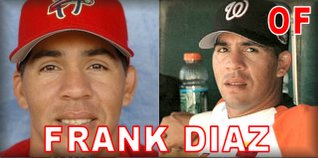


 3) 1926 (road) --- 4) 1936-'37, 1948-'51
3) 1926 (road) --- 4) 1936-'37, 1948-'51 3) 1968 - '71, and 2005 (home) --- 4) 2005 (road)
3) 1968 - '71, and 2005 (home) --- 4) 2005 (road) Buddy Meyer --- Walter Johnson
Buddy Meyer --- Walter Johnson Ed Yost --- Muddy Ruel
Ed Yost --- Muddy Ruel Roger Peckinpaugh --- Joe Cronin
Roger Peckinpaugh --- Joe Cronin Del Unser --- Darold Knowles
Del Unser --- Darold Knowles Ed Stroud - Mike Epstein
Ed Stroud - Mike Epstein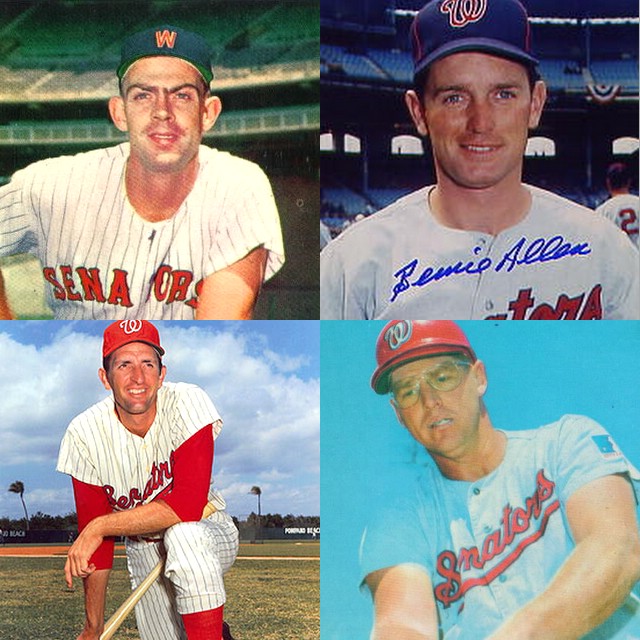 3)1968 -- 4)1969 - 1971
3)1968 -- 4)1969 - 1971